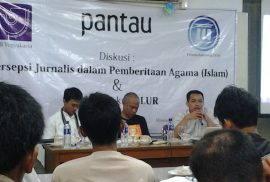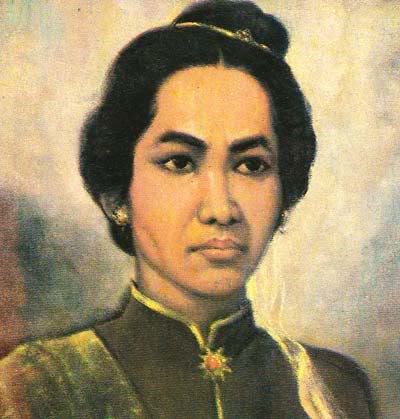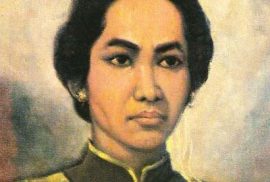Suhadi Cholil* | CRCS | Artikel
 Kebebasan pers di era Reformasi walaupun jauh lebih terbuka dibanding pada masa Orde Baru, namun, meminjam istilah Endy Bayuni, dalam bidang jurnalisme agama para jurnalis masih sulit memanfaatkan kebebasan ini untuk menyokong kesetaraan hak sipil warga. Hal ini terlihat dari hasil survei yang dilakukan Yayasan Pantau mengenai persepsi wartawan Indonesia terhadap Islam tahun 2012. Survei yang dilakukan terhadap 600 wartawan di 16 propinsi ini memperlihatkan tingginya kecenderungan wartawan Indonesia yang mengidentifikasi diri sebagai Islam dari pada sebagai Indonesia. Identifikasi ini berimplikasi pada kentalnya bias wartawan ketika memberitakan kekerasan terhadap kelompok-kelompok minoritas. Ini terlihat dari penggunaan kata-kata yang cenderung menghakimi seperti: “sesat”, “harus ditobatkan”, dan lain-lain. Bias ini menurut saya timbul karena jurnalis sulit membedakan antara arena keberagamaan personalnya dengan arena profesinya sebagai jurnalis. Tulisan ini akan mencermati lebih jauh beberapa temuan, tidak semuanya karena keterbatasan ruang, dari hasil survei Yayasan Pantau tersebut.
Kebebasan pers di era Reformasi walaupun jauh lebih terbuka dibanding pada masa Orde Baru, namun, meminjam istilah Endy Bayuni, dalam bidang jurnalisme agama para jurnalis masih sulit memanfaatkan kebebasan ini untuk menyokong kesetaraan hak sipil warga. Hal ini terlihat dari hasil survei yang dilakukan Yayasan Pantau mengenai persepsi wartawan Indonesia terhadap Islam tahun 2012. Survei yang dilakukan terhadap 600 wartawan di 16 propinsi ini memperlihatkan tingginya kecenderungan wartawan Indonesia yang mengidentifikasi diri sebagai Islam dari pada sebagai Indonesia. Identifikasi ini berimplikasi pada kentalnya bias wartawan ketika memberitakan kekerasan terhadap kelompok-kelompok minoritas. Ini terlihat dari penggunaan kata-kata yang cenderung menghakimi seperti: “sesat”, “harus ditobatkan”, dan lain-lain. Bias ini menurut saya timbul karena jurnalis sulit membedakan antara arena keberagamaan personalnya dengan arena profesinya sebagai jurnalis. Tulisan ini akan mencermati lebih jauh beberapa temuan, tidak semuanya karena keterbatasan ruang, dari hasil survei Yayasan Pantau tersebut.


 Jacqueline Aquino Siapno, dalam sebuah artikel berjudul “Syari’a Moral Policing and The Politics of Consent in Aceh”, menulis bahwa perempuan Aceh tidaklah seperti yang selama ini digambarkan oleh kebanyakan laporan internasional mengenai perempuan Aceh, yang dilanggar hak-haknya oleh penerapan syari’ah Islam. Pengalamannya selama penelitian di Aceh justru menunjukkan sebaliknya, perempuan Aceh adalah perempuan yang mandiri, memiliki mobilitas tinggi, dan memiliki posisi tawar/kuasa yang lebih atas laki-laki (matrifocality). Untuk itu ia menawarkan sudut pandang lain dalam melihat perempuan Aceh. Tulisan ini merupakan review atas artikel Siapno tersebut yang dimuat di Jurnal Social Difference-Online Vol. 1 Dec 2011.
Jacqueline Aquino Siapno, dalam sebuah artikel berjudul “Syari’a Moral Policing and The Politics of Consent in Aceh”, menulis bahwa perempuan Aceh tidaklah seperti yang selama ini digambarkan oleh kebanyakan laporan internasional mengenai perempuan Aceh, yang dilanggar hak-haknya oleh penerapan syari’ah Islam. Pengalamannya selama penelitian di Aceh justru menunjukkan sebaliknya, perempuan Aceh adalah perempuan yang mandiri, memiliki mobilitas tinggi, dan memiliki posisi tawar/kuasa yang lebih atas laki-laki (matrifocality). Untuk itu ia menawarkan sudut pandang lain dalam melihat perempuan Aceh. Tulisan ini merupakan review atas artikel Siapno tersebut yang dimuat di Jurnal Social Difference-Online Vol. 1 Dec 2011.
